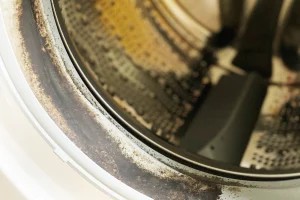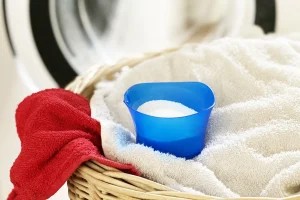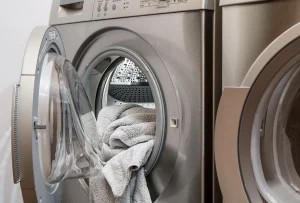Is your laundry emitting an unpleasant, stale odor instead of smelling fresh and clean? If your clothes smell musty after washing, you’re not alone. Many people experience this frustrating issue. At WHY.EDU.VN, we understand your need for a solution. This guide explores the reasons behind that lingering damp smell and offers practical solutions to ensure your laundry smells its best. Discover expert tips and tricks to banish musty smells and keep your clothes smelling fresh, including addressing trapped moisture, mold and mildew issues, and stale odors.
1. Dirty Washing Machine: A Breeding Ground for Odors
Your washing machine, despite its cleaning function, can become a harbor for bacteria, mold, and mildew. According to a study in Applied and Environmental Microbiology, residual water in washing machines can lead to odor issues and cross-contamination of laundry. This buildup, often unseen, can be the culprit behind why clothes smell musty after washing.
1.1 Addressing Hidden Dirt and Grime
Regularly cleaning your washing machine is essential. Here’s how to tackle the issue:
- Clean the drum: Run an empty cycle with hot water and a cup of white vinegar or a washing machine cleaner.
- Scrub the seals: Wipe down the rubber seals around the door, removing any visible mold or grime.
- Clean the dispenser: Remove and clean the detergent and fabric softener dispensers, as they can accumulate residue.
- Check the filter: Locate and clean the filter, usually at the bottom front of the machine, to remove trapped debris.
- Inspect hoses: Check water supply hoses for any signs of damage or buildup.
- Air it out: Leave the washing machine door ajar after each use to allow it to dry completely.
1.2 Preventing Future Buildup
Prevention is key to maintaining a clean, odor-free washing machine. Follow these tips:
- Use the correct detergent amount: Excess detergent can leave residue that promotes mold growth.
- Run regular maintenance cycles: Use a washing machine cleaner monthly to prevent buildup.
- Wipe down the machine: After each use, wipe down the interior of the drum and seals.
2. Detergent Overload: The Unintended Consequence
Using too much detergent might seem like a way to get clothes extra clean, but it can actually cause them to smell musty after washing. Excess detergent doesn’t rinse out completely, leaving a residue that attracts moisture and promotes mold and bacteria growth.
2.1 Finding the Right Balance
Accurate detergent dosage is essential for clean and fresh-smelling clothes. Here’s how to get it right:
- Read the label: Always follow the detergent manufacturer’s instructions for dosage based on load size and soil level.
- Use a measuring cup: Avoid estimating. Use a measuring cup or the detergent’s provided scoop.
- Consider load size: Adjust the detergent amount based on whether you’re washing a small, medium, or large load.
- Use HE detergent for HE machines: High-efficiency (HE) washing machines require specially formulated HE detergents that produce less suds.
2.2 Alternative Detergent Options
Consider these options for a better laundry experience:
- Detergent sheets or pods: These pre-measured options eliminate guesswork and ensure accurate dosage.
- Eco-friendly detergents: Many eco-friendly detergents are formulated to rinse cleanly and leave less residue.
3. Overloading the Washing Machine: A Recipe for Stale Smells
Overloading the washing machine restricts water flow and prevents detergent from properly reaching all items. This leads to inadequate cleaning and can result in why clothes smell musty after washing. Clothes need room to move freely to get thoroughly clean.
3.1 The Importance of Proper Load Size
To ensure effective cleaning and prevent musty smells, adhere to these guidelines:
- Check the manufacturer’s guide: Consult your washing machine’s manual for the recommended load capacity.
- Leave room in the drum: Don’t pack the drum so full that clothes are tightly compressed.
- Consider the type of clothing: Bulky items like towels and bedding require more space than lighter clothing.
3.2 Dividing Large Loads
When faced with a large laundry pile, it’s best to divide it into smaller, manageable loads. This ensures:
- Thorough cleaning: Each item gets sufficient exposure to water and detergent.
- Proper rinsing: Detergent residue is effectively removed.
- Better drying: Clothes dry more evenly and quickly.
4. Delayed Laundry: Time is of the Essence
Leaving wet clothes in the washing machine for extended periods creates a breeding ground for bacteria and mold, leading to a musty odor. Promptly removing clothes after washing is crucial for maintaining their freshness.
4.1 Minimizing Delay Time
Follow these tips to minimize the time wet clothes sit in the washing machine:
- Set a timer: Use a timer or phone reminder to alert you when the wash cycle is complete.
- Unload immediately: As soon as the cycle ends, transfer clothes to the dryer or a drying rack.
- Use the delay start function wisely: If you need to delay the wash, time it so the cycle finishes when you’re available to unload.
4.2 Addressing Forgotten Loads
If you forget about a load of wet clothes, take these steps:
- Rewash the clothes: Rewash the clothes with detergent and a cup of white vinegar to eliminate any mold or bacteria that may have grown.
- Dry immediately: Promptly dry the rewashed clothes to prevent the odor from returning.
5. High Humidity: A Drying Challenge
In humid environments, clothes take longer to dry, increasing the risk of mold and mildew growth. This can leave your laundry smelling musty after washing, even if you’ve followed all the other steps correctly.
5.1 Optimizing Indoor Drying
To improve indoor drying in humid conditions:
- Use a dehumidifier: A dehumidifier removes excess moisture from the air, speeding up the drying process.
- Ensure good ventilation: Open windows or use fans to circulate air in the drying area.
- Space clothes apart: Avoid overcrowding clothes on the drying rack to allow for better airflow.
- Choose the right drying rack: Use a rack with ample space between bars for optimal ventilation.
5.2 Enhancing Outdoor Drying
If outdoor drying is an option, consider these tips:
- Choose a sunny, breezy day: Sunlight and wind help to dry clothes quickly and effectively.
- Hang clothes properly: Use clothespins to secure items to the line and space them apart.
- Avoid drying in shaded areas: Shady spots take longer for clothes to dry, increasing the risk of musty odors.
6. Inadequate Drying: The Final Step to Freshness
Failing to thoroughly dry clothes before storing them is a common reason why clothes smell musty after washing. Dampness encourages mold and mildew growth, leading to unpleasant odors.
6.1 Ensuring Complete Dryness
To guarantee clothes are completely dry:
- Check for dampness: Before folding or hanging clothes, feel them for any lingering dampness, especially in seams and thicker areas.
- Use the dryer effectively: Choose the appropriate dryer setting and ensure the clothes are fully dry before removing them.
- Air-dry completely: If air-drying, allow clothes to dry until they are completely free of moisture.
6.2 Addressing Lingering Dampness
If you find dampness after drying:
- Extend drying time: Put the clothes back in the dryer for an additional cycle or leave them on the drying rack longer.
- Use a fan: Position a fan to blow directly on the clothes to speed up the drying process.
7. Storing Damp Clothes: An Open Invitation to Mold
Storing clothes that are even slightly damp is a surefire way to develop musty odors. Dampness trapped in fabrics creates an ideal environment for mold and mildew to thrive.
7.1 Verifying Dryness Before Storage
Take these precautions to avoid storing damp clothes:
- Double-check dryness: Before folding or hanging clothes, ensure they are completely dry to the touch.
- Allow clothes to cool: After drying, let clothes cool completely before storing them, as warmth can trap moisture.
7.2 Addressing Existing Musty Storage
If you discover musty-smelling clothes in storage:
- Launder again: Rewash the clothes with detergent and a cup of white vinegar.
- Dry thoroughly: Ensure the clothes are completely dry before returning them to storage.
- Clean the storage area: Clean the closet or drawers where the clothes were stored to remove any mold or mildew spores.
8. Lack of Airflow: Suffocating Your Fabrics
Clothes need airflow to stay fresh. When packed too tightly, they can develop stale or musty odors. A study in PLOS One showed insufficient airflow can lead to stuffy odors. Proper ventilation is essential for maintaining the freshness of your wardrobe.
8.1 Promoting Air Circulation
To encourage airflow in your closet and drawers:
- Space clothes apart: Avoid overcrowding your closet. Leave space between hangers to allow air to circulate.
- Use breathable storage containers: When storing clothes, use breathable containers made of fabric or mesh.
- Open closet doors: Periodically open closet doors to allow fresh air to circulate.
8.2 Decluttering for Better Airflow
Decluttering your wardrobe can significantly improve airflow:
- Remove unwanted items: Get rid of clothes you no longer wear to create more space.
- Organize by season: Store out-of-season clothes in separate containers to free up space in your closet.
9. Prolonged Storage: The Stale Smell of Neglect
Clothes stored for extended periods can develop a stale or musty odor. This is due to the breakdown of fibers and the accumulation of dust and other particles.
9.1 Refreshing Stored Clothes
To revive clothes that have been in storage:
- Air them out: Hang clothes outside on a clothesline or in a well-ventilated area for several hours.
- Wash if necessary: If airing out doesn’t eliminate the odor, wash the clothes with detergent and a cup of white vinegar.
9.2 Preventing Stale Smells in Storage
To prevent stale smells in stored clothes:
- Wash before storing: Wash clothes before storing them to remove any dirt or odors.
- Use scented sachets: Place scented sachets or dryer sheets in storage containers to keep clothes smelling fresh.
10. Low Wash Temperatures: Missing the Mark
Washing clothes in cold water is energy-efficient and gentle on fabrics, but it may not effectively remove all odors and bacteria. A Journal of Chromatography study suggests that biofilm buildup can be difficult to deal with at lower temperatures.
10.1 Balancing Temperature and Fabric Care
Consider these factors when choosing a wash temperature:
| Temperature | Benefits | Drawbacks | Ideal For |
|---|---|---|---|
| Cold | Energy-efficient, gentle on fabrics | May not remove all odors and bacteria | Delicates, lightly soiled items, bright colors |
| Warm | Good balance of cleaning and fabric care | Uses more energy than cold water | Most everyday clothing |
| Hot | Best for removing odors and bacteria | Can damage some fabrics and fade colors | Heavily soiled items, whites, items that need disinfecting |






10.2 Using Hot Water Strategically
Use hot water for items that need thorough cleaning and odor removal, such as:
- Towels and bedding: These items can harbor bacteria and odors.
- Workout clothes: These items accumulate sweat and bacteria.
- Heavily soiled items: Hot water helps to break down dirt and stains.
Bonus Tips for Eliminating Musty Smells
Switch to a Higher Quality Detergent
Low-quality detergents often leave residue on fabrics, leading to musty odors. Opt for a detergent with high-quality ingredients that thoroughly clean and rinse away. Look for detergents with freshness-enhancing ingredients.
Soak Clothes in White Vinegar
White vinegar neutralizes odors and prevents musty smells. Before washing, soak clothes in a solution of one cup of white vinegar and a bucket of hot water for about an hour. Then, wash as usual.
Which Clothes Are Most Susceptible to Musty Smells?
Certain types of clothes are more prone to retaining odors. Synthetic materials like polyester and nylon trap sweat and bacteria. Workout attire and sports uniforms accumulate sweat and bacteria. Natural fibers like wool and silk can retain odors if not properly cared for.
By following these tips, you can prevent your clothes from smelling musty after washing and enjoy fresh, clean laundry every time.
If you’re still struggling with musty-smelling clothes after washing, don’t hesitate to seek expert advice. WHY.EDU.VN offers a platform to ask questions and receive answers from knowledgeable professionals. Contact us at 101 Curiosity Lane, Answer Town, CA 90210, United States, or WhatsApp us at +1 (213) 555-0101. Visit our website, why.edu.vn, to explore more solutions to your everyday questions.
FAQ: Musty Laundry Odor
Here are some frequently asked questions about why clothes smell musty after washing, along with comprehensive answers to help you troubleshoot and solve the problem:
1. Why do my clothes smell like mildew even after washing?
Mildew is a type of mold that thrives in damp environments. If your clothes smell like mildew after washing, it indicates that they haven’t dried properly, allowing mold to grow. This could be due to several factors, including leaving wet clothes in the washing machine for too long, drying clothes indoors in a poorly ventilated area, or storing clothes that are not completely dry.
2. Can my washing machine cause my clothes to smell musty?
Yes, a dirty washing machine can definitely cause your clothes to smell musty. Washing machines can harbor bacteria, mold, and mildew, especially in the drum, seals, and detergent dispenser. These contaminants can transfer to your clothes during the wash cycle, resulting in a musty odor.
3. How can I clean my washing machine to prevent musty smells?
To clean your washing machine and prevent musty smells:
- Run an empty cycle with hot water and a cup of white vinegar or a washing machine cleaner.
- Scrub the rubber seals around the door with a solution of bleach and water.
- Remove and clean the detergent and fabric softener dispensers.
- Locate and clean the filter to remove any trapped debris.
- Leave the washing machine door ajar after each use to allow it to dry completely.
4. Is it better to use liquid or powder detergent to avoid musty smells?
Both liquid and powder detergents can be effective, but powder detergents are generally less likely to leave residue in the washing machine. Liquid detergents can sometimes accumulate in the dispenser and create a breeding ground for mold and bacteria.
5. Can using too much detergent cause my clothes to smell musty?
Yes, using too much detergent can cause your clothes to smell musty. Excess detergent may not rinse out completely, leaving a residue that attracts moisture and promotes mold and bacteria growth. Always follow the detergent manufacturer’s instructions for dosage based on load size and soil level.
6. Why do my towels smell musty even after washing?
Towels are particularly prone to developing musty smells because they absorb a lot of moisture and take longer to dry. If towels are not dried completely, they can develop mold and mildew. To prevent this, make sure to dry towels thoroughly after each use and wash them regularly in hot water with a cup of white vinegar.
7. How can I prevent my clothes from smelling musty when drying them indoors?
To prevent musty smells when drying clothes indoors:
- Use a dehumidifier to remove excess moisture from the air.
- Ensure good ventilation by opening windows or using fans.
- Space clothes apart on the drying rack to allow for better airflow.
- Avoid drying clothes in damp or poorly ventilated areas.
8. Does white vinegar really help get rid of musty smells in laundry?
Yes, white vinegar is an excellent natural deodorizer and can effectively remove musty smells from laundry. White vinegar’s acidity neutralizes alkaline odors. Add a cup of white vinegar to the wash cycle along with your regular detergent, or soak clothes in a solution of white vinegar and water before washing.
9. What types of fabric are most prone to musty smells?
Certain fabrics are more prone to retaining odors than others. Synthetic materials like polyester and nylon trap sweat and bacteria. Natural fibers like cotton, wool, and silk can also retain odors if not properly cared for.
10. Can I use essential oils to prevent musty smells in my laundry?
Yes, some essential oils have antimicrobial properties and can help to prevent musty smells in your laundry. Add a few drops of tea tree oil, lavender oil, or eucalyptus oil to the wash cycle along with your regular detergent. However, be sure to dilute the essential oils properly and test them on a small area of fabric first to ensure they don’t cause staining or discoloration.